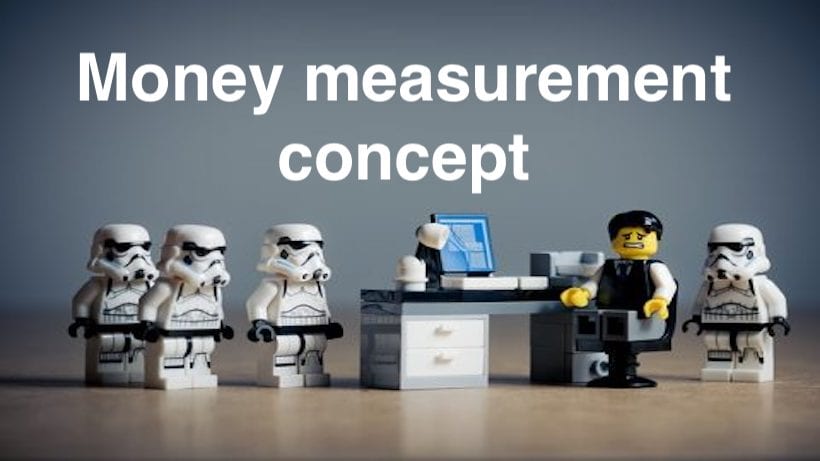Money measurement concept:As per this concept, only those transactions, which can be measured in terms of money are recorded. Since money is the medium of exchange and the standard of economic value, this concept requires that those transactions alone that are capable of being measured in terms of money be only to be recorded in the books of accounts. Transactions, even if, they affect the results of the business materially, are not recorded if they are not convertible in monetary terms.
Transactions and events that cannot be expressed in terms of money are not recorded in the business books. For example; employees of the organization are, no doubt, the assets of the organizations but their measurement in monetary terms is not possible therefore, not included in the books of account of the organization. Measuring unit for money is taken as the currency of the ruling country i.e., the ruling currency of a country provides a common denomination for the value of material objects. The monetary unit though an inelastic yardstick, remains indispensable tool of accounting.
Money measurement concept
It may be mentioned that when transactions occur across the boundary of a country, one may see many currencies. Suppose an Indian businessman sells goods worth Rs. 50 lakhs at home and he also sells goods worth of 1 lakh Euro in the United States. What is his total sales?Rs. 50 lakhs plus 1 lakh Euro.
These are not amenable to even arithmetic treatment. So transactions are to be recorded at uniform monetary unit i.e. in one currency. Suppose EURO 1 = Rs.55
Advertisement
Content in this Article
Total Sales = Rs50 lakhs plus 55 lakhs = Rs 105 lakhs. Money Measurement Concept imparts the essential exibility for measurement and interpretation of accounting data.
In Simple Words – Only those transactions, which can be measured in terms of money, are recorded.
Effects:
- Employees are not recorded as an Asset in the Balance Sheet.
- Inherently generated goodwill is not recorded in the books.
- Qualitative information is not recorded in the books of account
Money measurement concept Example
Thus, as per the money measurement concept, transactions which can be expressed in terms of money are recorded in the books of accounts. For example, sale of goods worth Rs.200000, purchase of raw materials Rs.100000, Rent Paid Rs.10000 etc. are expressed in terms of money, and so they are recorded in the books of accounts. But the transactions which cannot be expressed in monetary terms are not recorded in the books of accounts. For example, sincerity, loyality, honesty of employees are not recorded in books of accounts because these cannot be measured in terms of money although they do affect the profits and losses of the business concern.
Another aspect of this concept is that the records of the transactions are to be kept not in the physical units but in the monetary unit. For example, at the end of the year 2006, an organisation may have a factory on a piece of land measuring 10 acres, office building containing 50 rooms, 50 personal computers, 50 office chairs and tables, 100 kg of raw materials etc. These are expressed in different units. But for accounting purposes they are to be recorded in money terms i.e. in rupees.
In this case, the cost of factory land may be say Rs.12 crore, office building of Rs.10 crore, computers Rs.10 lakhs, office chairs and tables Rs.2 lakhs, raw material Rs.30 lakhs. Thus, the total assets of the organisation are valued at Rs.22 crore and Rs.42 lakhs. Therefore, the transactions which can be expressed in terms of money is recorded in the accounts books, that too in terms of money and not in terms of the quantity.
Significance
The following points highlight the significance of money measurement concept :
This concept guides accountants what to record and what not to record. l It helps in recording business transactions uniformly. l If all the business transactions are expressed in monetary terms, it will be easy to understand the accounts prepared by the business enterprise. l It facilitates comparison of business performance of two different periods of the same firm or of the two different firms for the same period.
INTEXT QUESTIONS
Put a tick mark (√) against the information that should be recorded in the books of accounts and cross mark (×) against the information that should not be recorded
- (i) Health of a managing director
- (ii) Purchase of factory building Rs.10 crore
- (iii) Rent paid Rs.100000
- (iv) Goods worth Rs.10000 given as charity
- (v) Delay in supply of raw materials
Recommended

